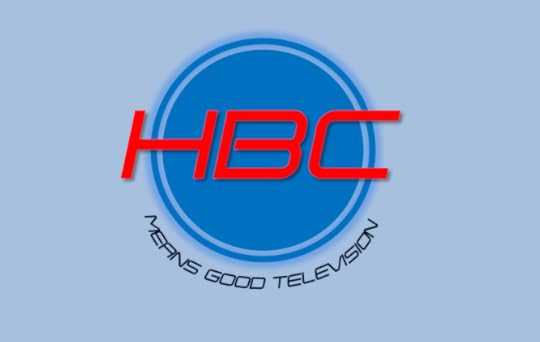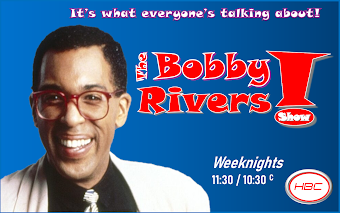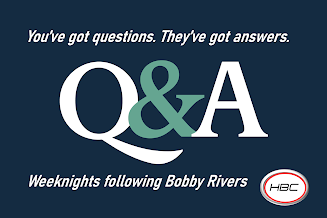If I ran the network, part 4

Recently I kicked off a new feature, "If I Ran the Network," a series of TV concepts that would never have made it to the small screen without network executives screwing them up. If you have similar ideas, please share them in the comments section; if I get enough, I'll use them to put together a complete prime-time lineup for the fictional HBC Network!
 As ABC and CBS eventually discovered, a network has to have a late-night talk show in its lineup in order to achieve some level of credibility; the Fox network even kicked off its programming with one, The Late Show Starring Joan Rivers, a full six months before its primetime lineup debuted. The sad fact is that many of these shows were failures, in terms of ratings if not quality, and the even sadder fact is that we would be infinitely better off if we had old movies running in place of the "talk" shows that exist in late-night today.
As ABC and CBS eventually discovered, a network has to have a late-night talk show in its lineup in order to achieve some level of credibility; the Fox network even kicked off its programming with one, The Late Show Starring Joan Rivers, a full six months before its primetime lineup debuted. The sad fact is that many of these shows were failures, in terms of ratings if not quality, and the even sadder fact is that we would be infinitely better off if we had old movies running in place of the "talk" shows that exist in late-night today. I don't say this because of any particular political content (note that, Guardian), but because today's shows have completely lost the art of conversation; there isn’t much talking, guests don’t stick around to engage in banter, and an hour isn’t much time to get a good conversation in anyway. Let’s face it; today’s shows are mostly for actors and singers to talk about their latest movies or albums, and for comedians to tell a few jokes. Everything’s been pre-screened, and the host isn’t much more than a glorified press agent setting the guests up for whatever it is they want to plug. Such has always been the case, to a point, but Carson and Paar and Cavett knew how to interview someone, rather than simply feed them lines. Perhaps more important, they knew how to listen.
So in developing the station's flagship late-night show, I had several criteria to keep in mind. First, the running time needed to be restored to the traditional 90 minutes; second, guests should be encouraged to remain for the entire show, taking part in the conversation; third, the show had to have a host that could carry the load—glib, knowledgeable, a good listener as well as talker, with the ability to not only interview guests but keep the conversation going, and able to handle serious interviews as well as light ones. A sardonic sense of humor was definitely a plus. That's not asking too much, is it?
 Thus was the genesis of The Bobby Rivers Show. I enjoyed him on his VH-1 program Watch Bobby Rivers, and thought he'd be perfect for the kind of program I had in mind. Like Cavett, he had the ability to ask incisive questions; like Carson, he knew how to play off of his guests; like Paar, he knew the show would only be as good as the guests made it. He could puncture pomposity without being cruel, and didn't take himself too seriously. And he knew everyone. I thought that with a format similar to that used by, say, Graham Norton—no desk, guests sitting around in a way conducive to conversation—and a Tonight Show-style house band led by a Quincy Jones protégé, we'd have a hit on our hands. I'd kind of filed the idea away, but was reminded of it when he died last year, and I still think it would have been a terrific show.
Thus was the genesis of The Bobby Rivers Show. I enjoyed him on his VH-1 program Watch Bobby Rivers, and thought he'd be perfect for the kind of program I had in mind. Like Cavett, he had the ability to ask incisive questions; like Carson, he knew how to play off of his guests; like Paar, he knew the show would only be as good as the guests made it. He could puncture pomposity without being cruel, and didn't take himself too seriously. And he knew everyone. I thought that with a format similar to that used by, say, Graham Norton—no desk, guests sitting around in a way conducive to conversation—and a Tonight Show-style house band led by a Quincy Jones protégé, we'd have a hit on our hands. I'd kind of filed the idea away, but was reminded of it when he died last year, and I still think it would have been a terrific show.After that, viewers need something to wind down, and to provide a contrast to Bobby Rivers, I propose a one-hour show called Q&A. Similar to the original format of Tom Snyder's Tomorrow, this would have been a one-on-one interview, appropriate to a 1:00 a.m. hour: no studio audience, no musical guests, and no set—just a black backdrop, illuminating only the host and the guest. And here's the twist: except for the introduction at the beginning of the show and the transitions going into and coming out of the commercial break, the camera would remain focused only on the guest. No reaction shots of the host, no mugging for the viewers. You might see that guest from two or three different angles; it wouldn't be a static shot, as if you were watching a security camera. But this would be all about the guest.
 Obviously you'd need a special kind of host for a program like this, and I never did come up with someone I thought would really work, which is why Q&A probably would never have seen the light of day. (Airing at one in the morning, it wouldn't have seen the light anyway, but you know what I mean.) The obvious contemporary choice would have been someone like Charlie Rose, or Brian Lamb from C-SPAN's Booknotes. James Lipton might have been a good choice, but I don't think he could have been satisfied with not being seen on camera, and I've got other plans for him anyway.
Obviously you'd need a special kind of host for a program like this, and I never did come up with someone I thought would really work, which is why Q&A probably would never have seen the light of day. (Airing at one in the morning, it wouldn't have seen the light anyway, but you know what I mean.) The obvious contemporary choice would have been someone like Charlie Rose, or Brian Lamb from C-SPAN's Booknotes. James Lipton might have been a good choice, but I don't think he could have been satisfied with not being seen on camera, and I've got other plans for him anyway. The problems with a late-night lineup like this should be obvious to you. Too boring, the network suits would have said. Nobody wants to think just before they go to sleep—they want personalities. In other words, these shows would have been too smart for viewers. And maybe they're right, but I don't think so. Late-night programs nowadays have a very narrow, niche audience; they're not mainstream, and they don't try to be. It's unfortunate, and that's why I think there would be an audience for them. We'd have to get someone other than Bobby Rivers, unfortunately; maybe we can check and see what Graham Norton is doing. TV
Published on July 03, 2024 05:00
No comments have been added yet.
It's About TV!
Insightful commentary on how classic TV shows mirrored and influenced American society, tracing the impact of iconic series on national identity, cultural change, and the challenges we face today.
- Mitchell Hadley's profile
- 5 followers



